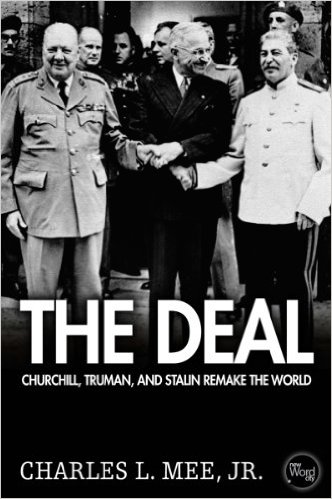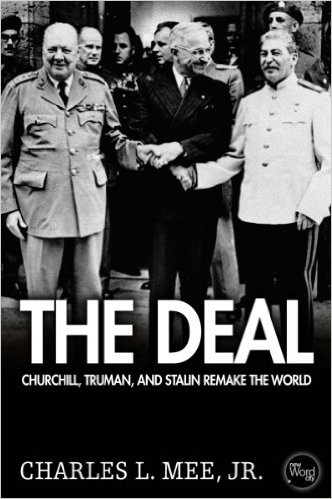
Finest Hour 170
Books, Arts & Curiosities – New Mee Same as the Old Mee

December 3, 2015
Finest Hour 170, Fall 2015
Page 41
Review by Mark Klobas
Charles L. Mee, Jr., The Deal: Churchill, Truman, and Stalin Remake the World, New World City, 2014, 348 pages, $2.99 on Kindle. ASIN B00HO6ZEHC
 In 1975 Charles L. Mee published Meeting at Potsdam. His account of the July 1945 summit between the victorious “Big Three” Allied leaders became a standard popular history of the subject, one frequently reprinted for new audiences. Last year, on the eve of the seventieth anniversary of the conference, a book by Mee on the same subject but with a different title was released by Kindle. Has Mee revisited his work?
In 1975 Charles L. Mee published Meeting at Potsdam. His account of the July 1945 summit between the victorious “Big Three” Allied leaders became a standard popular history of the subject, one frequently reprinted for new audiences. Last year, on the eve of the seventieth anniversary of the conference, a book by Mee on the same subject but with a different title was released by Kindle. Has Mee revisited his work?
The answer is no. Mee’s The Deal is simply Meeting at Potsdam in a new format. Apart from the title, everything in the original text has been imported intact into the electronic version, with no effort to correct, modify, or update Mee’s original work. The only difference in the new format is the addition of Wikipedia links embedded within the text, which provide a useful way for readers to learn more about the principals and some of the other subjects that the author mentions in the text. Yet this alone is poor compensation for the deficiencies it contains. For all of the strengths that The Deal inherits from Mee’s original book, it is now burdened with an even greater share of weaknesses.
The best part about the book is the narrative. Mee is a good storyteller and uses his sources well to present the record of the Potsdam conference. He focuses on the three main participants: Winston Churchill, Harry S. Truman, and Josef Stalin. Through the observations and recollections of the various staff members and other contemporary observers, he turns the conference into a dramatic interaction between some of the most important personages of the twentieth century—one that he sees as setting the stage for the Cold War that followed.
Unfortunately, there are a number of flaws in the story as Mee tells it, starting with a disappointing degree of moral equivalency between the three sides, which are portrayed as motivated by base concerns only. The portrayal of Truman is the most egregious example of this.

2024 International Churchill Conference
The President is depicted as almost eager to use the newly-developed atomic bomb on Japan, not as a means of ending the war but as a way of impressing Stalin with the scope of American power. Missing from this is any mention, let alone consideration, of the other factors influencing the decision, such as the casualty figures from the battles of Iwo Jima and Okinawa and the foreshadowing they offered of the bloodiness of any invasion of the Japanese home islands. Also left unacknowledged is the long shadow cast by the Paris Peace Conference over a quarter-century earlier—this despite the fact that several of the main people involved in the Potsdam meeting had attended that earlier conference and possessed firsthand memories of the failures of the last great postwar settlement.
It is not just Mee’s analysis that is flawed. His descriptions of the main personalities often veer towards caricature. Nowhere is this more evident than with Churchill, who is portrayed as an alcohol-fueled gasbag whose contributions to the talks were periodically hampered by the maladies of old age (the four-year age difference between Churchill and Stalin apparently spared the Soviet leader from similar issues). And Mee’s lack of endnotes makes it impossible to trace his source material.
A new edition could have improved upon Mee’s original text by addressing these concerns. Instead, by failing to do so, he has effectively doubled down on them by ignoring nearly four decades of scholarship based on the opening of archives previously unavailable to Mee. Simply consulting Martin Gilbert’s chapter on Potsdam in volume eight of the Official Biography, for example, would have provided an effective riposte to William Hayter’s complaint that Churchill was not reading his briefs. Instead, that misconception joins all of the others that are perpetuated without any reconsideration based upon recent research.
This is disappointing considering Mee’s gifts as a writer. His ability to give life to the contrived discussions that take place at such meetings is truly impressive and helps to explain the enduring appeal of this book. Releasing it in an electronic format, though, only ensures that many of the fallacies and erroneous interpretations contained within the text will be perpetuated for new readers. Anyone seeking to learn about the Potsdam Conference would be better served by turning to Michael Neiberg’s Potsdam: The End of World War II and the Remaking of Europe [reviewed in FH 169], which provides a fresh account that is far more balanced and informative than Mee’s dated effort.
Mark Klobas teaches history at Scottsdale College in Arizona.
Subscribe
WANT MORE?
Get the Churchill Bulletin delivered to your inbox once a month.


